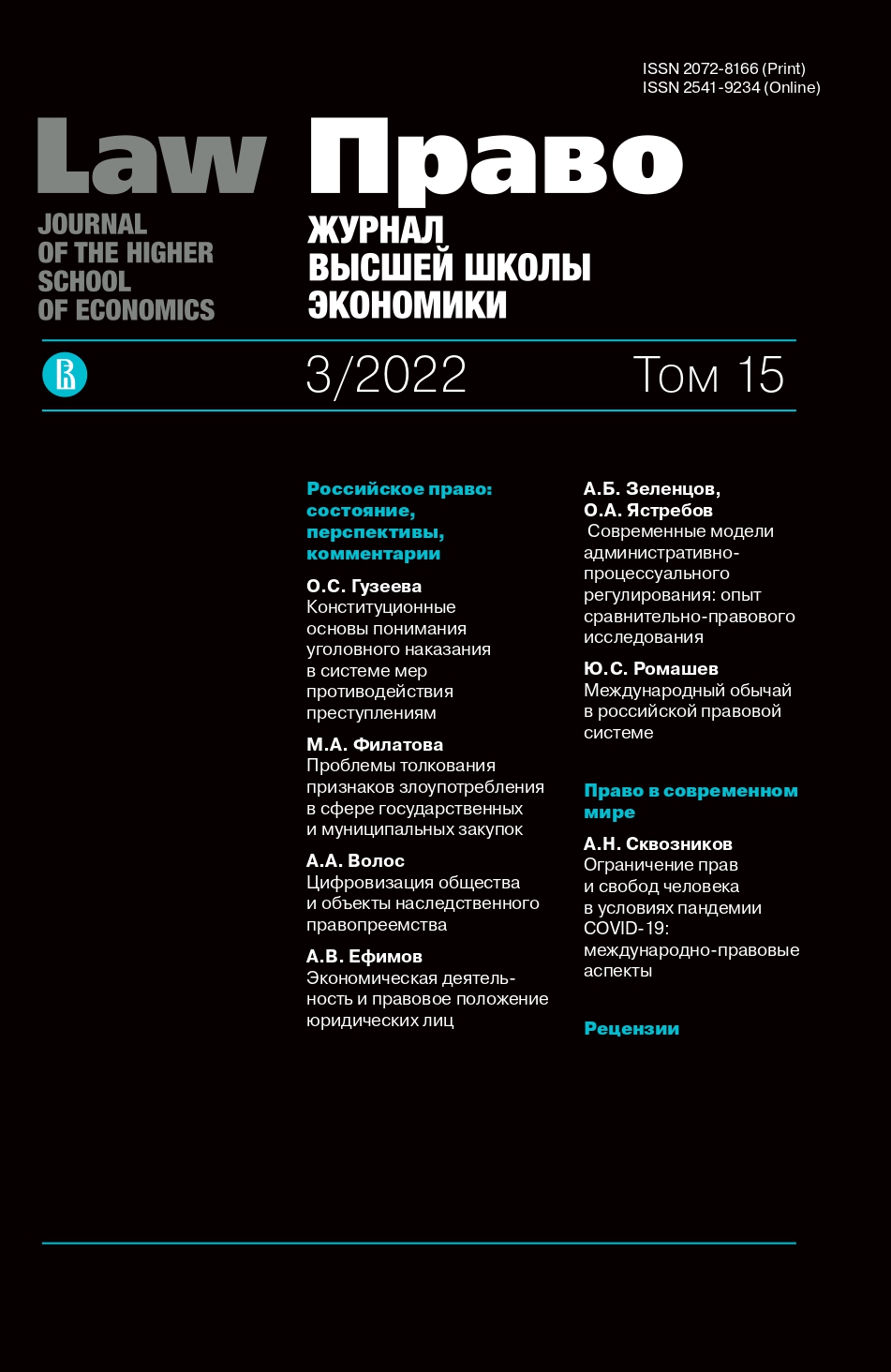New Unity of Government Cash Desk and Reform of the Cash Register in Russia
Abstract
The article is devoted to the assessment of changes in Russian budget legislation in recent years. These changes are connected with norms on the treasury account system, treasury service and treasury support. Collectively, these changes are assessed as reforms of the cash structure of the state. The article analyzes the advantages and potential capabilities of the new cash register system, including from the point of view of financial stability. It gives a classification of the existing type of cash structure in Russia, which is characterized as mixed (combining the competence of the banking system and the government), subject to the regime of unity of the cash register. At the same time, the concept of cash monopoly is introduced, which corresponds to the state monopoly on banking activities. In addition, the author concluded that it is advisable to update the definition of the principle of the unity of budget account, enshrined in the Budget Code of the Russian Federation. This decision is associated with the actual extension of state control to new types financial assets, any private finances and the functioning of the state payment system (treasury payment system). The author’s version of this definition is proposed. The new definition includes a feature that allows the cash register to be separated in compliance with the unity of the cash register from the cash monopoly mode. This feature makes it possible to establish a systematic connection between the unity of the cash register, as a legal principle, with other legal principles, including the constitutional level. The proposed changes, according to the author, on the one hand create an opportunity to concentrate significant financial resources in the hands of the government and provide new opportunities for analysis, management and control in the field of public finance, and on the other hand, avoid the introduction of emergency measures, in particular, in the form of a cash monopoly. The part of the article is devoted to the limits of the spread of treasury support and the unity of the cash register, which are considered through a number of dichotomous pairs that arise at the junction of public and private interests, where the freedom of the parties to the contract is limited by the norms of budget legislation. In particular, this is a limitation of the payment obligations of the budget arising from concluded state (municipal) contracts and the problem of transferring ownership of funds allocated from the budget. This method is proposed to implement to test the legal regulation of the budget process.
References
Artiukhin R.E. (2003) On cash desk unity principle. BiNOjournal, no. 1, pp. 75-79 (in Russ.)
Doinikov I.V. (2013) Russian managerial system: issues of legal regulation. Administrativnoe i municipalnoe pravo=Administrative and Municipal Law, no. 7, pp. 731-742 (in Russ.)
Glezin C.C. (1952) Execution of state budget in the USSR. Moscow: Gosfinizdat, 116 p. (in Russ.)
Hodskiy L.V. (2016) State economy and financial science. Publichno-pravovye issledovania=Public Law Studies, no. 1.
Krasin L. (1925) Planning economy and external trade monopoly. Moscow: Gosplan Press, 39 p. (in Russ.)
Lagutin I.B. (2021) Organizational and legal specifics of the Russian regional control and cash bodies operations: to the issue of membership in the EURORAI efficiency. Finansovoe pravo=Financial Law, no. 1, pp. 3-9 (in Russ.) DOI: https://doi.org/10.18572/1813-1220-2021-1-3-9
Lebedev V.A. (2000) The financial law. Moscow: Statut, 461 p. (in Russ.)
Ledneva Yu. V. (2021) The subjects of finance law: contemporary transformation of its status. Finansovoe pravo=Financial Law, no. 4, pp. 30-34 (in Russ.)
Ozerov I.H. (1908) The basics of financial science. Moscow: Sytin Publishers, 336 p. (in Russ.)
Piscotin M.I. (1971) The Soviet budgetary law. Moscow: Juridicheskaya literatura, 312 p. (in Russ.)
Plastinina E.A. (2019) On the special account: exchequer control over contracts in 2019. Pro goszakaz.rf=State Request, no. 2, pp. 58-63 (in Russ.)
Rovinskiy E.A. (1960) Main aspects of the Soviet financial law theory. Moscow: Gosjurizdat, 193 p. (in Russ.)
Sattarova N.A. (2021) Financial and legal specifics of the calculation. Finansovoe pravo=Financial Law, no. 9, pp. 17-19 (in Russ.)
Safina S.D. (2017) Exchequer maintaining of contracts: legal regulations and financial control practice. Finansovoe pravo=Financial Law, no. 12, pp. 12-15 (in Russ.)
Urazova S.A. (2011) Special features and meaning of the credit reform of 1930-1932. Den'gi i kredit=Money and Credit, no. 4, pp. 58-63 (in Russ.)
Zvonova E.A., Kuznetsov A.B. et al. (2020) Special features and prospects of two-tier financial system at national and regional levels. Mir novoy ekonomiki=World of Modern Economics, no. 1, pp. 26-33 (in Russ.) DOI: https://doi.org/10.26794/2220-6469-2020-14-1-26-33
Copyright (c) 2022 Law Journal of the Higher School of Economics

This work is licensed under a Creative Commons Attribution-ShareAlike 4.0 International License.


















